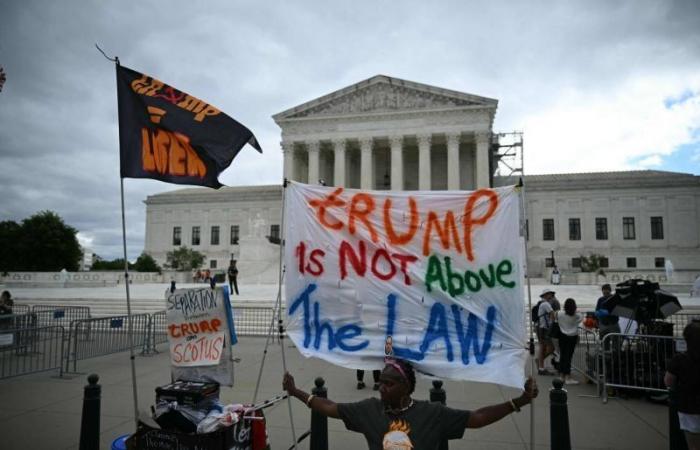The conservative-majority US Supreme Court on Monday referred the question of Donald Trump’s criminal immunity as ex-president to lower courts, further delaying his federal trial in Washington.
By a vote of six to three, the six conservative justices against the three progressives, the Court held that “the president enjoys no immunity for his unofficial acts” but that he “is entitled to at least a presumption of immunity for his official acts.”
Donald Trump, campaigning to return to the White House, immediately hailed a “great victory” for democracy.
By deciding on February 28 to take up this question, then by scheduling the debates nearly three months later, the highest court in the United States had already considerably postponed the federal trial of the former Republican president for attempting to illegally reverse the results of the 2020 election won by Joe Biden.
The entire procedure for this trial, initially scheduled to start on March 4 and postponed indefinitely, had already been suspended for four months.
During the debates, while the judges were generally skeptical of the absolute immunity claimed by the Republican candidate, several, particularly among conservatives, insisted on the long-term repercussions of their decision.
“We are writing a rule for posterity,” Neil Gorsuch observed, referring to the unprecedented nature of the question.
“This affair has enormous implications for the future of the presidency and the country,” added his colleague Brett Kavanaugh.
Appeal
Targeted by four separate criminal proceedings, Donald Trump is doing everything possible to go to trial as late as possible, at least after the presidential election.
He was convicted on May 30 by a New York court of “aggravated accounting falsification to conceal a conspiracy to pervert the 2016 election.” His sentence will be pronounced on July 11.
But this first criminal conviction, unprecedented for a former American president, in the least politically heavy of the four procedures, also risks being the only one before the vote.
Because through appeals, Donald Trump’s lawyers managed to postpone other trials until further notice, at the federal level for withholding classified documents after his departure from the White House and before the courts of the key state of Georgia for election interference in 2020.
If re-elected, Donald Trump could, once inaugurated in January 2025, order a halt to federal prosecutions against him.
The conservative-majority US Supreme Court on Monday referred to lower courts the question of Donald Trump’s criminal immunity as former president, further delaying the holding of his federal trial in Washington. By six votes to three, those of six conservative judges against the three progressives, the Court considers that “the…
- -





